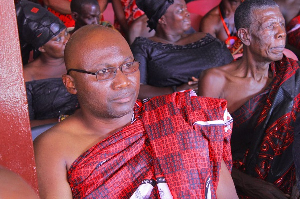- Home - News
- TWI News | TV
- Polls
- Year In Review
- News Archive
- Crime & Punishment
- Politics
- Regional
- Editorial
- Health
- Ghanaians Abroad
- Tabloid
- Africa
- Religion
- Election 2020
- Coronavirus
- News Videos | TV
- Photo Archives
- News Headlines
- Press Release
Opinions of Saturday, 23 July 2016
Columnist: Hinneh, Samuel
West Africa needs regulations on off grid energy to spur growth and innovation
By Samuel Hinneh
West African countries need to put in place regulations that can accelerate the growth of off grid energy particularly in remote areas to drive electrification of the sub region, says Chief Operating Officer of Solektra International, Bokar Ture.
Regulations have to offer an enabling environment which attracts private sector investment to undertake various innovation projects in rural areas of West Africa, Ture stated.
"For most governments in West Africa there is not much regulations in the off grid space. We have to bear in mind that opening the energy sector to non-state actors is also fairly new.
"But there will come a time where consumer protection will be very important and in that sense the government will have to sit down not only with people but with private companies.
"Private companies can find the right balance because what will discourage private companies is that the tariffs is lower than their potential cost of investment, whether the tariff does not allow them to recoup their investment,” he stated at the inaugural Smart Villages regional workshop in West Africa, held in Accra, Ghana.
"So it will be sensitive balancing act but it will have to be done, right now a lot places in some countries, the tariff is lower than it needs to be, but then again if the government wants to protect consumers it can continue to provide subsidies but the key thing is that for it to attract private sector, it needs to make sure that there is attractive tariffs system in place,’’ Ture says.
The Smart Villages Initiative aims to provide policymakers, donors, and development agencies concerned with rural energy access with new insights on the real barriers to energy access in villages in developing countries—technological, financial and political—and how they can be overcome.
Over a period of three years, the Smart Villages Initiative is conducting workshops and follow-up engagement activities across East and West Africa, South and Southeast Asia, and Central and South America focusing on energy provision to off-grid rural areas and how that energy can catalyse development.
According to him, some countries in the ECOWAS region are opening up the power or electricity market, most notably, Nigeria, so that private sector investment could be made in the power sector.
"But I think that what has been looked at is more so supporting generation for the national utility to dispatch energy needs. However, what now needs to take place in great attention is the off grid space. That attention has to be done in a way that will attract private sector investment,’’ he emphasised.
Analysts around the globe believe that off grid electrification is the fastest way to get energy access rate to a point where it will meet the goals of the United Nations goal on energy for all, Ture noted.
"Because the utilities are not able to extend their grid at a pace that is acceptable to the populace. so they have to go into the off grid space, go into mini grid to power. Being that state energy providers are limited in terms of their investment, their cash flow or funding they are given by the central government depending on country, so they need to allow the private sector to go on and do it especially, pretty seen as the most effective way," he says.
A PwC report released in May this year says new renewable off-grid technologies, in combination with innovative business models and mobile payment systems hold the key to rural electrification.
New approaches to beyond the grid electrification need to be adapted to achieve the UN 2030 target of electricity for all, according to the report.
The report emphasised that policymakers need to get out of a top-down mindset and support the role that a range of renewable energy off-grid technologies and new business models can play.
Advanced renewable technologies and storage solutions could also threaten the existing business models of power utilities across the African continent in the future, the report adds.
John Gibbs, Africa Deals Power & Utility Lead, PwC, said: “For the millions of people who don’t currently have access to electricity, the old assumption that they will have to wait for grid extensions is being turned on its head by new technological possibilities. 634 million people without electricity are in Africa. Faster progress is needed, and we believe it can be achieved if national energy policies adopt a more comprehensive approach to energy access, embracing the new starting points for energy provided by standalone renewable technology and mini-grids.”
Current electrification strategies tend to focus on national grid extension plans. Instead, Georg Baecker, senior manager and energy policy and regulation expert, PwC said: “Policymakers need to embrace the new renewable off-grid technologies and innovative business models. The combination of centralised top-down grid extension with decentralised demand-driven bottom-up strategies, in the form of mini grids and especially standalone solutions, will speed up the increase in electrification levels.”
The report foresees a major transformation of the electricity sector in the period ahead. Angeli Hoekstra, Power & Utility Specialist for PwC Africa, pointed out: “‘All or nothing’ approaches that focus primarily on the national grid are increasingly out of step to what is now possible in power technology. Advances in technology are rapidly changing the options available beyond the grid. Falling solar technology costs have spurred the growth of standalone home systems and are changing the economics of mini-grid systems. Battery storage technology is fast evolving to the point where it is going to play a significant role in utility-scale solar power storage and is beginning to feature in smaller-scale off-grid solutions. Together with access to mobile technology and mobile payment systems for microloans, a new era has arrived for beyond the grid electrification.”
The PwC report sets out five recommendations for accelerating the increase of electrification such as to develop an integrated energy access plan and map – so that everyone can plan with more certainty for either off-grid or grid extension solutions.
The report also recommends the creation of an enabling environment for off-grid development - including clearer criteria for mini-grid development, support for skills and training and more supportive regulation to allow private players to unlock the off-grid market potential.
The report further recommends the need to recognise the value of and promote the growth of mobile infrastructure, microloans and payment solutions in supporting energy access - mobile infrastructure is proving crucial in the take-up of standalone home systems, giving providers a low-cost channel for customer relations and an ability to automatically manage non-payment.
Other recommendations are to establish an off-grid innovation and development fund - a highly visible development and innovation fund can play an important part in spurring off-grid growth in each country and to the need to have a high-level energy access champion that can drive results – to cut through bottlenecks and monitor results.










